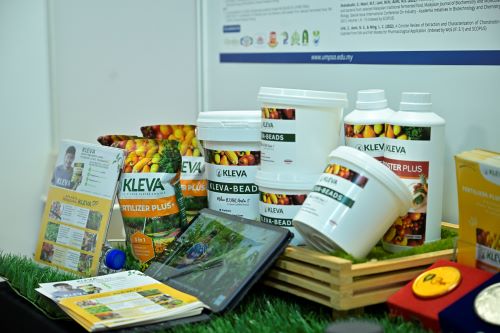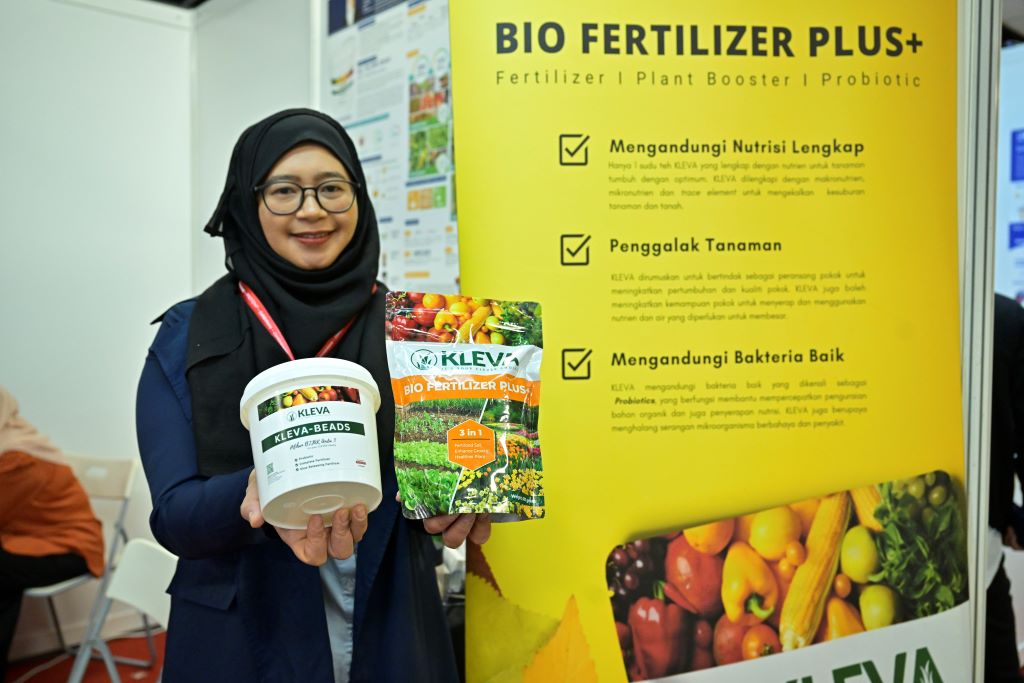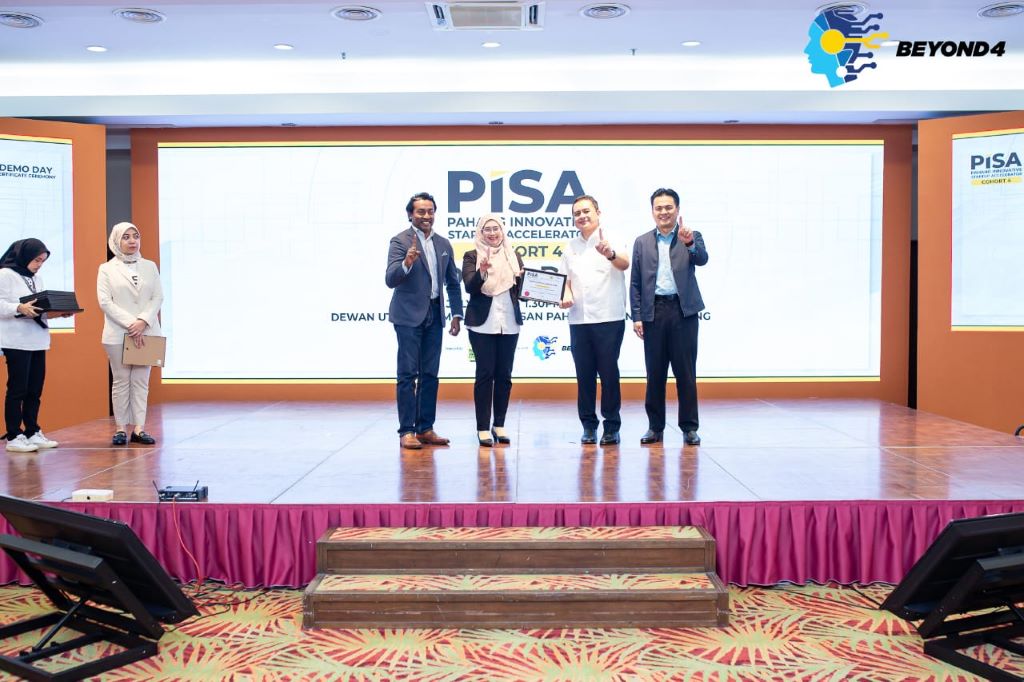Associate Professor Dr. Nina Suhaity innovates Probiotics for agriculture
GAMBANG, 19 July 2024 - The use of probiotics in the agricultural sector has the potential to create more sustainable farming practices and reduce the reliance on synthetic chemical fertilizers, thereby helping to preserve soil fertility in the long term.
In response, Associate Professor Dr. Nina Suhaity Azmi, a researcher and lecturer from the Faculty of Science and Industrial Technology (FSTI) at Universiti Malaysia Pahang Al-Sultan Abdullah (UMPSA), has conducted research focusing on the use of probiotics isolated from local sources.
Her main study, titled "KLEVA-BEADS: Premium Biofertilizer for Sustainable Agriculture," investigates the potential of beneficial bacteria used for gut health being applied in agricultural biotechnology.
According to Associate Professor Dr. Nina Suhaity Azmi, this research began in 2014 and was completed in 2017.
"The idea for this study started with the aim of reducing Malaysia's dependence on imported probiotic products.
“The initial research focused on isolating and identifying lactic acid bacteria (LAB) beneficial for human gut health from local and halal sources.
“I saw great potential in using local bacteria to meet local needs and address halal issues in imported probiotic products," she explained.
She noted that most of the bacteria used are imported, and their sources are often unclear.
“This raises halal concerns, especially for health products used by Muslim consumers.
“Additionally, the materials used in the fermentation process to produce these bacteria are also an issue.
“During this period, we identified many bacterial properties and criteria with various potential applications,” she added.
Her research not only focuses on the application of probiotics from local sources for human gut health but also extends to the use of beneficial bacteria or probiotics in agriculture and livestock (including animal and fish farming).
In 2021, she commercialized a biofertilizer product under the brand KLEVA, which uses probiotics for agriculture.
“This research was conducted with a team of researchers from the startup Glycobio International Sdn. Bhd. and FSTI, UMPSA.
"Probiotics in agriculture do not replace conventional fertilizers like nitrogen, phosphorus, and potassium, which provide essential nutrients to plants.
“Instead, they work synergistically with fertilizers to enhance nutrient absorption and effectiveness.
"Probiotic bacteria, such as soil decomposers, help break down organic matter in the soil and fertilizers, making nutrients more easily absorbed by plants and improving overall soil fertility," said Associate Professor Dr. Nina Suhaity Azmi, who holds a PhD in Biochemistry from the University of Liverpool, United Kingdom.

This process aids in producing nutrients that are more easily absorbed by plants, thus enhancing soil fertility overall. Associate Professor Dr. Nina Suhaity Azmi noted that the probiotic bacteria used can fix nitrogen, break down phosphates, and potassium, thereby improving soil fertility and plant growth.
"This can help reduce the use of chemical pesticides and enhance the effectiveness of conventional fertilizers.
“The process helps produce nutrients that are more easily absorbed by plants, thus improving overall soil fertility.
"The use of probiotics in agriculture aims to act as a bio-control agent that can improve plant health, enhance plant defense systems, and help fight disease pathogens," she added.
Additionally, Associate Professor Dr. Nina Suhaity Azmi said the use of probiotics in agriculture has the potential to create more sustainable farming practices.
“Reducing the use of synthetic chemical fertilizers can also help preserve soil fertility in the long run.
"I anticipate that research on probiotic technology will continue to be needed in the agricultural sector.
“Therefore, my research team is actively isolating and studying more bacteria that can aid in agriculture, particularly in increasing crop yields and promoting more sustainable farming.
"The use of probiotics must be accompanied by technology that ensures probiotics can be stored or have a long shelf life, making the product viable and marketable according to industry needs, especially on a large scale," she said.
She hopes that this effort will yield results in improving the readiness of technology, manufacturing, and bacterial processing in Malaysia without relying on external products.
However, she noted that the probiotic industry in Malaysia still requires greater awareness of the benefits of probiotics among the public to ensure the market for probiotics continues to grow in line with research and development in the biotechnology industry, particularly in probiotic technology.
"In the future, my research team and I plan to expand the use of bacteria as a technology in various sectors, with specific applications suited to their benefits," she explained.
Associate Professor Dr. Nina Suhaity Azmi has also conducted several studies and successfully secured funding, including CDU230108: Empowering the RAPTA & B40 Community in Pekan Pahang with Biotechnology and Fertigation Systems in Agriculture, UIC231514: In Vitro Elucidation of Anti-Hyperglycemic and Antioxidant Activity of Lactic Acid Bacteria Isolated from Malaysian Fermented Foods: Jeruk Maman, Pekasam and Tapai, Toray Science Foundation (Japan), UIC221101: KLEVA Showcase Farm Development Project, RDU180304: Immobilization of Potential Probiotics of Lactic Acid Bacteria (LAB) Strains Isolated from Selected Fermented Products, Commercialization of La Biotic: Multipurpose Probiotic Powder, and PGRS1703101: Immobilization of Potential Lactic Acid Bacteria (LAB) Isolated From Selected Fermented Food.
Recently, in July 2024, Associate Professor Dr. Nina Suhaity Azmi secured funding to implement the "Reinforcing, Empowering, Assisting Career Hunter (REACH): TVET 2024" Programme.
This award is from the Pahang State Women’s Policy and Action Plan for the Technology Cluster.
For the record, Associate Professor Dr. Nina Suhaity Azmi won the Bumiputera Entrepreneur Startup Scheme (SUPERB) from TERAJU in 2017 with her product LA-BIOTIC: Premium Multipurpose Probiotic Powder.
Earlier, she successfully commercialized ‘Dr. Fur’, a pet fur serum using bio-active compounds, Glycosaminoglycans (GAGS), which are halal and extracted from marine sources.
This product was commercialized in 2018 under the MTDC-UMP Symbiosis CRDF 1 grant.
Associate Professor Dr. Nina Suhaity Azmi is also active in community service activities, such as sharing sessions through the "Community Connect" Programme organized by Bioeconomy Corporation with the theme "Food Security Crisis: Are You Kleva?", and as a speaker for the Innovative Women Program organized by the National Council of Women’s Organizations Malaysia (NCWO) titled "Formulating Probiotics in Agriculture."
Internationally, she was appointed as a Virtual Visiting Professor at Prince Songkhla University, Thailand, in 2021 with a lecture titled "Application of Sustainable Engineering Design for Agro-Machinery Technology and Agro-wastes Value Added-Products," and again in 2023 with a lecture on "Sustainable Organic Wastes Utilization for Value-Added Product Development: Probiotic and Bioproduct."
Associate Professor Dr. Nina Suhaity Azmi, along with her startup Glycobio International Sdn. Bhd., was also selected as one of the top ten startups out of 20 at the Pahang Innovative Startup Accelerator (PISA) programme organized by Yayasan Pahang.
By: Hafizatulazlin Abdul Aziz and Safriza Baharuddin, Centre for Corporate Communications
Translation by: Aminatul Nor Mohamed Said, UMPSA Career Centre (UMPSACC)
- 180 views











